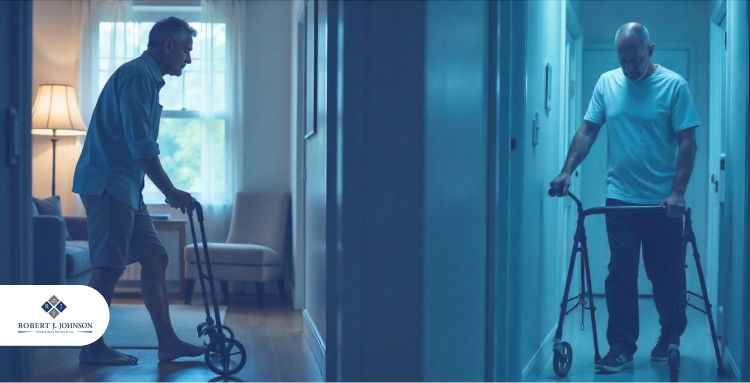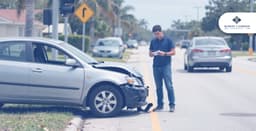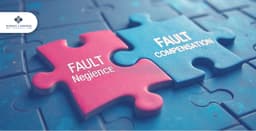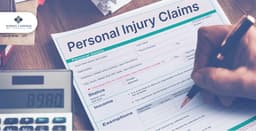
July 15, 2025
Understanding Florida's Personal Injury Laws: What You Need to Know
Life is strangely unpredictable. One moment, you're going about your day—running errands, enjoying the sunshine, and then suddenly, you're in an accident. Whether it’s a car crash, a slip and fall, or another unfortunate event. The truth is, accidents like these happen all the time and they throw your life into chaos faster than you can blink. If you’re injured due to someone else’s negligence, you don’t just face the injury itself, you’re thrown into a legal battle that can feel as disorienting as the crash itself.
In a state like Florida, where the laws and rules are ever-shifting, it's important to know the terrain. What’s at stake? How do you make sure you're not left behind? Let’s take a closer look at what you need to know.
I) Key Legal Foundations: Negligence & Liability
In Florida's personal injury law, negligence occurs when someone fails to exercise the level of care that a reasonable person would under similar circumstances, leading to harm or injury.
To successfully prove negligence, four essential elements must be established:
Duty of Care: This is the legal obligation to act with a certain standard of care to prevent harm to others. For instance, drivers must obey traffic laws and operate their vehicles safely to protect other road users.
Breach of Duty: A breach occurs when an individual fails to meet their duty of care. Examples include a driver running a red light or a property owner neglecting to fix a known hazard.
Causation: This element requires showing that the breach of duty directly caused the injury. It's not enough that a duty was breached; that breach must have led to the harm suffered.
Damages: The plaintiff must have suffered actual harm, such as physical injuries, financial loss, or emotional distress, as a result of the breach.
Examples of Negligence:
Car Accidents: Common negligent behaviors include distracted driving, speeding, and disobeying traffic signals. For example, a driver texting while driving may not notice a red light, leading to a collision.
More For You: What Happens After a Deposition in a Car Accident Case
Slip and Fall Incidents: Negligence can occur when property owners fail to maintain safe premises. Examples include wet floors without warning signs, uneven surfaces, or inadequate lighting. For instance, a grocery store that doesn't place a "wet floor" sign after mopping could be held liable if a customer slips and falls.
II) Florida’s No-Fault System for Auto Accidents

The no-fault auto insurance system requires drivers to carry Personal Injury Protection (PIP) coverage. This system ensures that, after an accident, your insurance covers medical expenses and certain other losses, regardless of who caused the collision.
How Personal Injury Protection (PIP) Works
PIP coverage in Florida typically includes:
Medical Expenses: Covers a portion of necessary medical costs resulting from the accident.
Lost Wages: Provides compensation for a percentage of lost income due to injury-related work absences.
Death Benefits: Offers a specified amount to beneficiaries in the event of a fatality resulting from the accident.
When You Can File a Lawsuit
While PIP covers many expenses, Florida law allows you to step outside the no-fault system and file a lawsuit against the at-fault driver if your injuries meet certain criteria, known as the serious injury threshold. This threshold includes:
Significant and permanent loss of an important bodily function
Permanent injury within a reasonable degree of medical probability
Significant and permanent scarring or disfigurement
Death
Meeting any of these conditions permits you to seek compensation beyond what PIP provides, including damages for pain and suffering.
Recent Updates in Florida Auto Insurance Laws
Florida's auto insurance landscape has seen recent legislative efforts to increase transparency and reduce premiums. These proposed laws focus on holding insurance companies accountable and addressing systemic issues within the industry.
How to Handle Insurance Companies After an Accident
Interactions with insurance companies post-accident can be challenging. Here are some steps to consider:
Report the Accident Promptly: Notify your insurance provider as soon as possible to initiate the claims process.
Document Everything: Keep detailed records of medical treatments, expenses, and any correspondence with insurance representatives.
Be Cautious with Statements: Provide factual information but avoid speculative or detailed statements without legal counsel, as these can impact your claim.
Consult an Attorney: If injuries are severe or if there's a dispute about fault or coverage, seeking legal advice can help protect your rights and ensure you receive appropriate compensation.
III) Florida’s Most Important Personal Injury Laws

How you approach Florida’s personal injury laws can make or break your case. Missing deadlines or misjudging faults can cost you compensation. Two key factors, Statute of Limitations and Comparative Negligence, directly affect your recovery. Here’s what you need to know.
Statute of Limitations (Updated for 2025)
The statute of limitations sets the time frame within which you must file a personal injury lawsuit. As of March 24, 2023, Florida has reduced this period from four years to two years for negligence-based personal injury claims. This means if you're injured due to someone else's negligence, you have two years from the date of the incident to file a lawsuit.
Exceptions to the Statute of Limitations
Certain situations can alter this two-year deadline:
Wrongful Death: Claims must be filed within two years from the date of death.
Medical Malpractice: Victims have two years from the date they discovered, or should have discovered, the injury to file a claim. However, all claims must be filed within four years of the incident, regardless of discovery.
Minors: If the injured party is a minor, the statute may be tolled (paused) until they reach the age of majority.
Comparative Negligence Rule
Florida follows a modified comparative negligence system with a 50% bar rule. This means you can recover damages only if you're 50% or less at fault for your injuries. If you're found to be more than 50% responsible, you're barred from receiving any compensation. Under this rule, your compensation decreases by your percentage of fault. For example, you're found 30% at fault in an accident with $100,000 in damages. You can recover $70,000 (i.e., $100,000 minus 30%).
Premises Liability in Florida
In Florida, premises liability law requires property owners to maintain safe premises, but their level of responsibility depends on the visitor’s status. Invitees (such as customers) receive the highest duty of care, requiring owners to inspect for hazards, address dangers, and provide warnings. Licensees (like social guests) must be warned of hidden risks, while trespassers are generally owed minimal protection—except in cases like children drawn to hazards (e.g., pools), where owners must take extra precautions.
Wrongful Death Laws in Florida
Wrongful death in Florida occurs when someone's negligence, wrongful act, or breach of contract leads to a fatality. Under Florida’s Wrongful Death Act, only the personal representative of the deceased’s estate can file a claim on behalf of eligible survivors, including the spouse, children, parents, and financially dependent blood relatives or adoptive siblings.
IV) Compensation: What Damages Can You Recover?

In Florida personal injury cases, damages fall into three categories: economic, non-economic, and punitive.
Economic Damages
Medical Bills: Costs for hospital stays, surgeries, medications, and future medical care.
Lost Wages: Income lost during recovery and potential future income loss.
Property Damage: Costs to repair or replace personal property, like vehicles.
Non-Economic Damages
Pain and Suffering: Physical and emotional distress caused by the injury.
Emotional Distress: Psychological impact, like anxiety or depression.
Loss of Consortium: Loss of companionship or support from a spouse or family member.
Punitive Damages
Awarded to punish the defendant for egregious actions and deter future misconduct, punitive damages are capped at three times the compensatory damages or $500,000, whichever is greater. If financial gain motivated the defendant, the cap increases to four times the compensatory damages or $2 million.
V) The Personal Injury Claim Process in Florida
Navigating the personal injury claim process in Florida requires a clear understanding of each step to ensure your rights are protected and to maximize potential compensation.
When to Seek Legal Counsel
It is wise to consult a personal injury attorney immediately after the incident.Early consultation allows for the preservation of vital evidence and ensures timely action within Florida's statute of limitations, which is generally 2 years from the date of the injury. Delaying legal counsel can jeopardize your ability to recover damages.
Gathering Evidence
Accident Reports: Official documentation of the incident.
Medical Records: Proof of injuries and treatments.
Witness Statements: Testimonies from those who saw the event.
Steps in a Personal Injury Case

Investigation: Your attorney reviews the incident, gathers evidence, and assesses the claim's strength.
Demand & Negotiation: A demand for compensation is made. Negotiations aim to settle without litigation.
Filing a Lawsuit: If negotiations fail, a formal complaint is filed, starting legal proceedings. Discovery allows both sides to exchange information.
Settlement vs. Trial: Many cases settle after discovery. If not, the case goes to trial for a judge or jury decision.
Avoid Legal Pitfalls: Must-Read Personal Injury Blogs
Injured? The Clock Is Ticking - Secure Your Rights
If you've been injured, taking action is essential. Florida law limits your time to file a claim, and delays can cost you the compensation you deserve. The sooner you act, the stronger your case.
With Robert J. Johnson, you’re never just another case number. Expect superior communication, ensuring you’re always in the loop. Our aggressive advocacy guarantees that insurance companies won’t take advantage of you. Best of all, you don’t pay unless he wins. No upfront fees. No hidden costs. If you don’t win, you owe nothing. Get a FREE, NO-OBLIGATION CONSULTATION today and secure the legal guidance you need without any financial stress.





































































